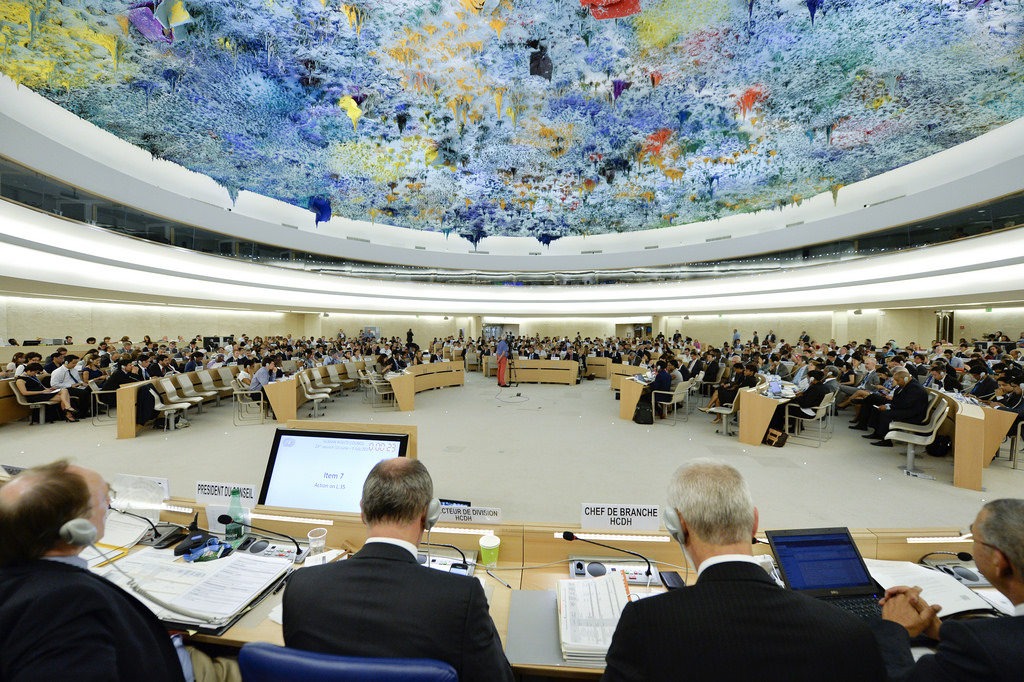Governments around the world claim to uphold human rights, and even to recognize that these same rights apply online. But words aren’t the same as action. The Universal Periodic Review (UPR) process is an opportunity to hold governments to account in the United Nations Human Rights Council.
Today we share our submissions of evidence for the UPR review of Chad, Central African Republic, China, Mexico, and Jordan.
Chad: blocking apps and news sites
Our submission on Chad, prepared jointly with Internet Sans Frontieres (ISF), REDHAC, and the Utopie Nord-Sud Association, draws attention to a critical issue in a number of countries: internet shutdowns, which include the blocking of messaging apps and social media platforms.
Earlier this month, Chad’s government shut down messaging apps and blocked BBC.com, violating the freedoms of expression and assembly, among others. This met with outcry from #KeepItOn coalition members Internet Sans Frontières (ISF) and the Open Observatory of Network Interference (OONI).
Chad had already imposed a shutdown this year, in January during trade union protests. Our submission to the UPR also notes that Chad previously shut off access to social networks from April 21 through December 3, 2016, following the presidential election that year.
These shutdowns have taken place in the context of a broader failure to protect freedom of expression rights. For instance, on September 30, 2016, government authorities in N’Djamena arrested blogger Tadjaine Mahamat Babouri for posting a video on Facebook in which he criticized the government’s management of public funds and the economic crises. Unfortunately, this is not an isolated event. The government has targeted many other bloggers and activists for exercising their right to free expression.
Central African Republic: poor internet access, threats to free expression
Our submission stresses how freedom of expression rights continue to decline in the Central African Republic (CAR). There is ongoing civil unrest and limited internet connectivity, and both government and rebel groups have threatened people’s access to information and right to free expression.
Internet usage in CAR is among the lowest in the region; only about 6% of the population has internet access. As a result, individuals rely on radio and short message services (SMS) to gather and disseminate information. However, ongoing threats by armed groups in CAR have forced a community radio station in the southeast region to close. In addition, in 2014 the government instituted an SMS ban, undermining citizens’ access of information amidst spiraling violence. At the time, Access Now submitted evidence about the ban to the International Criminal Court to assist in its preliminary investigations of crimes against humanity in the country.
China: localizing data and encryption keys
In our submission on China, we highlighted its growing capability to access and control the flow of users’ information. In 2016, Freedom House deemed China “the worst abuser of internet freedoms,” and its reputation for censorship remains accurate. The government is also increasingly undermining privacy in the name of cybersecurity and data protection. For instance, in June 2017 the Chinese Cybersecurity Law went into effect. This deeply flawed regulation strengthens the government’s data localization agenda.
Pursuant to this law, companies must store the information of Chinese users in China, including storing the keys to decrypt data, even though this threatens unlawful access by authorities. Apple is among the companies that is complying, moving iCloud accounts in February 2018 to Guizhou-Cloud Big Data, a state-run Chinese server. The law largely codifies measures the government has imposed since the 2010 introduction of “cyberspace sovereignty,” which also underpinned the 2015 National Security Law. By conflating cybersecurity and data protection, the law fails to protect users’ human rights, focusing on national interests.
Mexico: spying on civil society, violence against journalists
Our submission highlighted Mexico’s continued use of surveillance technology to undermine the human right to privacy. Mexico is among the world’s top customers of invasive surveillance tech, and relies on these tools in order to silence political dissenters. In 2017, Citizen Lab and R3D found at least 21 cases where the Mexican government used surveillance software from Israeli-U.S. company NSO Group to target journalists, human rights lawyers, activists, public health advocates, and political figures. Following this report, United Nations experts called for an independent investigation into the use of spyware against human rights defenders and journalists. For our part, Access Now campaigned against the sale of NSO Group to Blackstone Group, but to date, authorities have failed to hold the company and its owners accountable, or to investigate the use of its surveillance products in Mexico.
Violence, either by state or private actors, also threatens freedom of expression rights. Mexico is among the deadliest countries to be a journalist and the state has so far failed to meet its public commitment to end the culture of impunity.
Jordan: promoting laws that chill expression
Our submission notes that Jordan continues to restrict online connectivity and promote laws that chill freedom of expression. For instance, in 2017, the government amended the 2015 Electronic Crime Law in order to include a vague definition of hate speech. That same year, Jordanian authorities arrested eight individuals, including a former member of parliament and retired senior intelligence office, because of what they said online.
